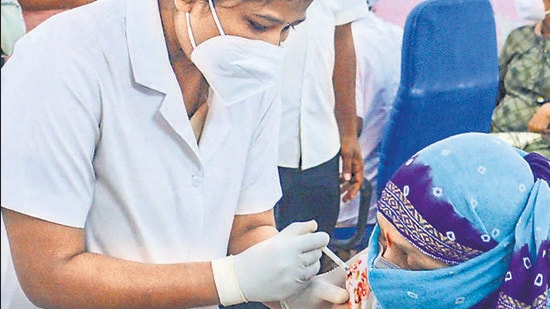Omicron in India: Consider vaccine booster shots for 40+, says expert panel
Omicron scare: India’s genomic sequencing consortium has suggested that booster shots of the Covid-19 vaccines be administered to people over the age of 40 years.
India’s genomic sequencing consortium has suggested that booster shots of the Covid-19 vaccines be administered to people over the age of 40 years, targeting those who are at the highest risk of exposure and severe disease, as one response to the new Omicron variant of the Sars-CoV-2 virus that causes coronavirus disease (Covid-19).

“Low levels of neutralising antibodies from the current vaccines are unlikely to be sufficient to neutralise Omicron, although the risk of severe disease is still likely to be reduced. Based on the preliminary data, it is likely that population immunity and vaccine-induced immunity may not sufficiently block its propagation,” said the Indian SARS-CoV-2 Genomics Consortium (INSACOG) in its weekly bulletin for November 29 released by the country’s department of biotechnology on Friday.
Since the bulletin was prepared, two cases of infection by the Omicron variant have been identified in India, and experts say many more could emerge in coming days.
A booster dose is an additional dose of the Covid-19 vaccine administered after completing the two-dose schedule of the vaccines currently in use to further increase the level of protection. The National Technical Advisory Group on Immunization (NTAGI), which recommends the vaccine use and its schedule to the central government, is to discuss the issue of booster dose in its recent meetings, as per government officials.
“Vaccination of all remaining unvaccinated at-risk people and consideration of a booster dose for those 40 years of age and over, first targeting the most high-risk / high-exposure may be considered, since low levels of neutralising antibodies from current vaccines are unlikely to be sufficient to neutralise Omicron, although risk of severe disease is still likely to be reduced,” the INSACOG bulletin said.
A researcher whose institution is part of INSACOG said there is no explicit recommendation.
“INSACOG is not recommending a booster dose; the document says vaccinate the unvaccinated and consider boosters for high-risk groups. There is no actual recommendation for booster; just a possibility as we get evidence for immune escape,” this person added on condition of anonymity.
Union health minister, Mansukh Mandaviya, said in parliament on Friday that the government will go by scientific advice to decide on boosters.
“We have two types of decision here: political and scientific. There is no solution to the political part of it but our decision has to be based on science,” said Mandaviya in Lok Sabha, during the discussion on Covid-19.
Several members sought clarity from the government on boosters, which have become the norm in the US and most European nations. They also asked about vaccination for children.
Mandaviya said 75 members took part in Thursday’s debate that lasted nearly 12 hours. The debate concluded past midnight and the minister gave his reply on Friday.
Senior government officials have also maintained since September, before the Omicron variant was detected, that the only question regarding boosters was “when” not “if”. . But experts and government officials have maintained that the priority was to vaccinate all adults first.
In addition, the fourth national round of sero-surveillance conducted in June-July showed that 67% of the population had antibodies against the Sars-CoV-2 virus.
The consortium in its bulletin has also said early detection and genomic sequencing, monitoring travel to and from known affected areas, and contact tracing of Covid-19 cases linked to the Omicron affected areas are important in ensuring that the infection does not spread.
INSACOG has also suggested increasing testing and looking out for S-gene dropout as a proxy for detecting Omicron cases in India. The RT-PCR kits look for a few target genes of the virus in a patient sample . Kits that use S-gene or regions of the spike protein, along with other targets, to look for the virus might register a false negative for the S gene and positive for the others because of the high number of mutations in the spike protein of the omicron virus.
“In some PCR tests one of the three target genes is not detected (called S gene dropout or S gene target failure). Such a phenomenon was previously seen for Alpha, which is currently not in active circulation and thus SGTF can be used as marker for this variant, pending sequencing confirmation,” INSACOG said in its bulletin.
According to the consortium, the Omicron variant has 15 mutations in the receptor binding domain that helps it connect with human cells.
“This is the highest number of mutations yet seen, many of which are at antibody binding sites and may reduce the effectiveness of neutralizing antibodies (antibodies that specifically target the virus and either destroy it or prevent it from entering the human cell),” INSACOG said.
Dr GC Khilnani, former head of the pulmonology department at All India Institute of Medical Sciences and the chairman of PSRI Institute of pulmonary, critical care, and sleep medicine, said, “We have to vaccinate the unvaccinated fast and also consider booster shot for others now.”
He added, “A study from Frace in 159 kidney transplant patients showed that they did not mount an immune response after receiving two doses of the vaccine, but after three 49% of them did. What this means is that those who are immunocompromised (such as people who have undergone transplant, have HIV/AIDS, or have cancers) a third dose must be administered even before six months and for all others after six months.”
But there is also an ethical issue here, he indicated.
“There are countries that have been able to vaccinate only 3% of the population and there are countries that have vaccinated over 80%. It has to be a global responsibility otherwise the virus will continue circulating.”





